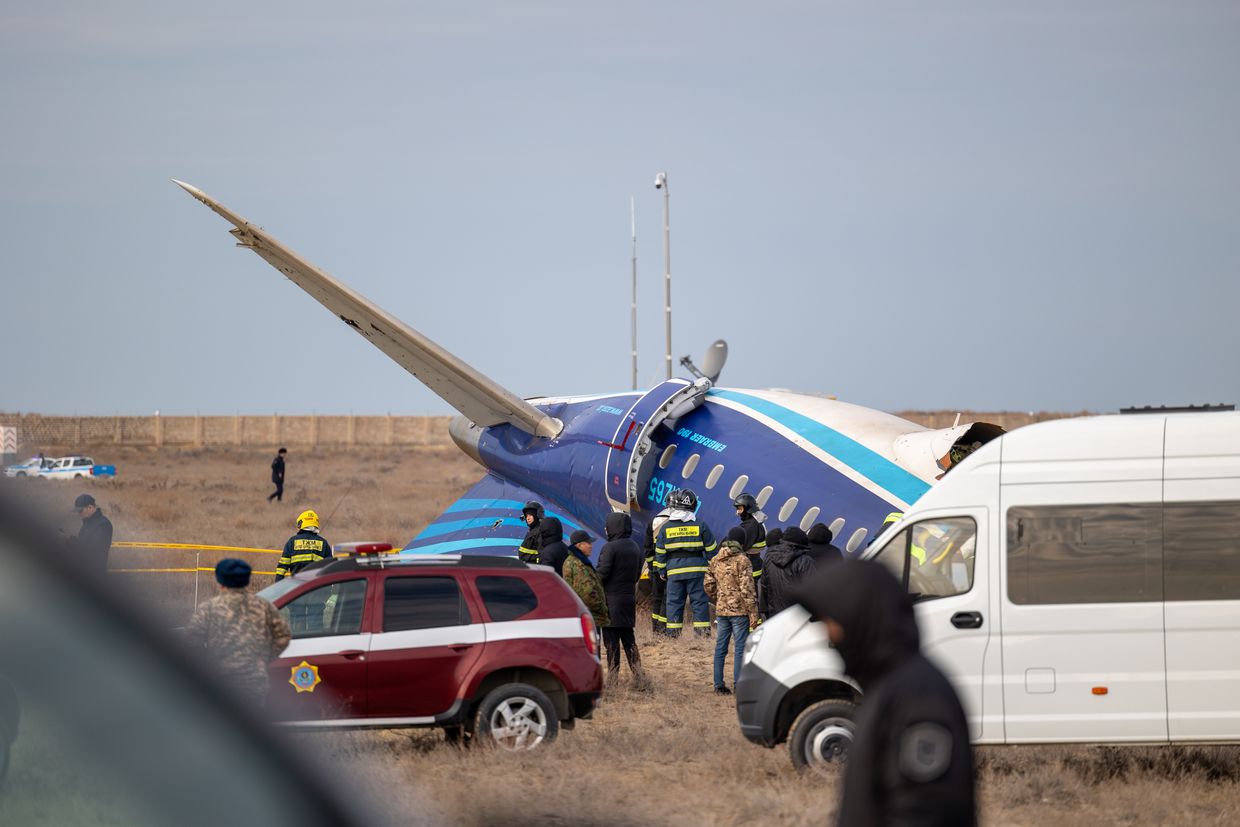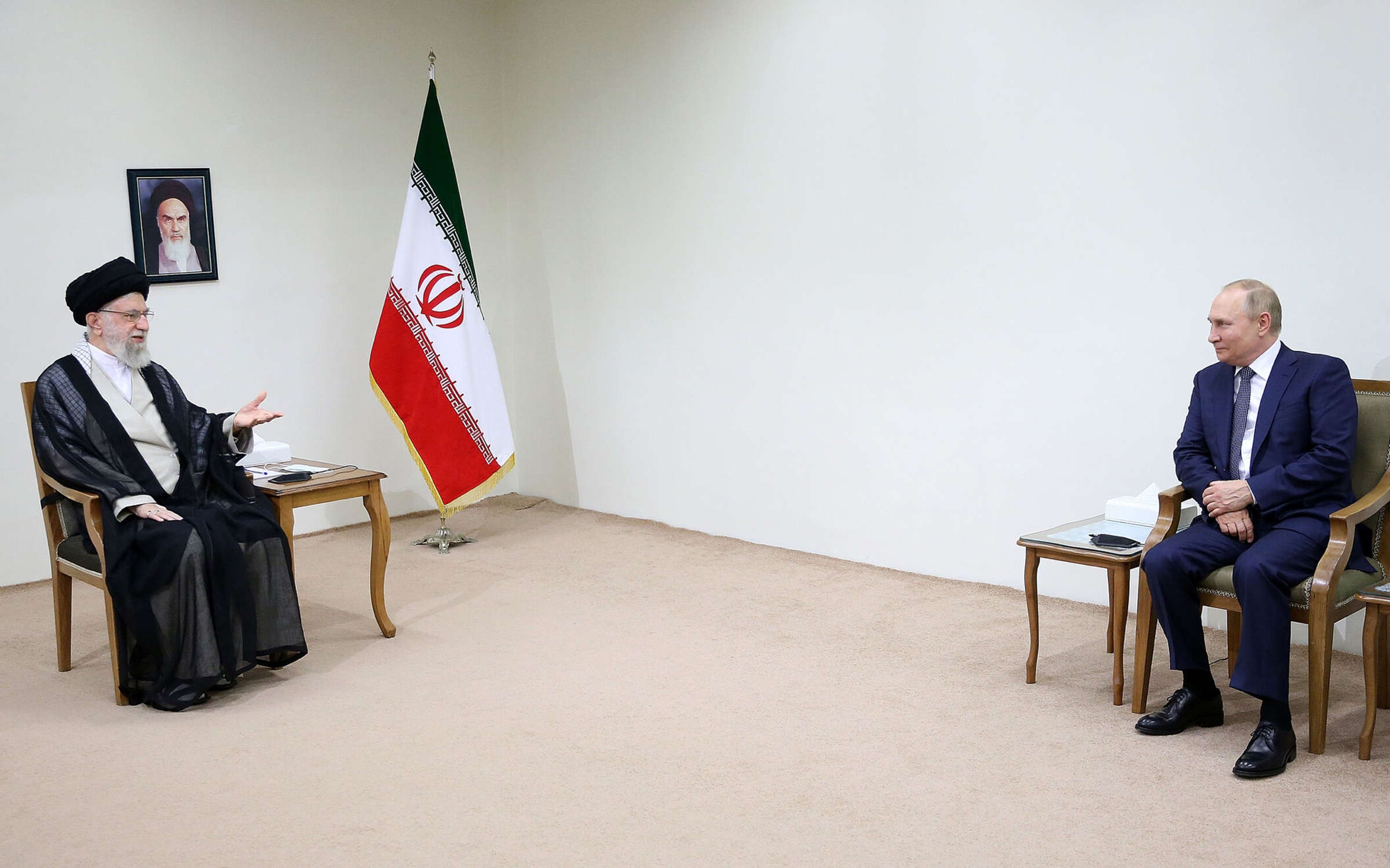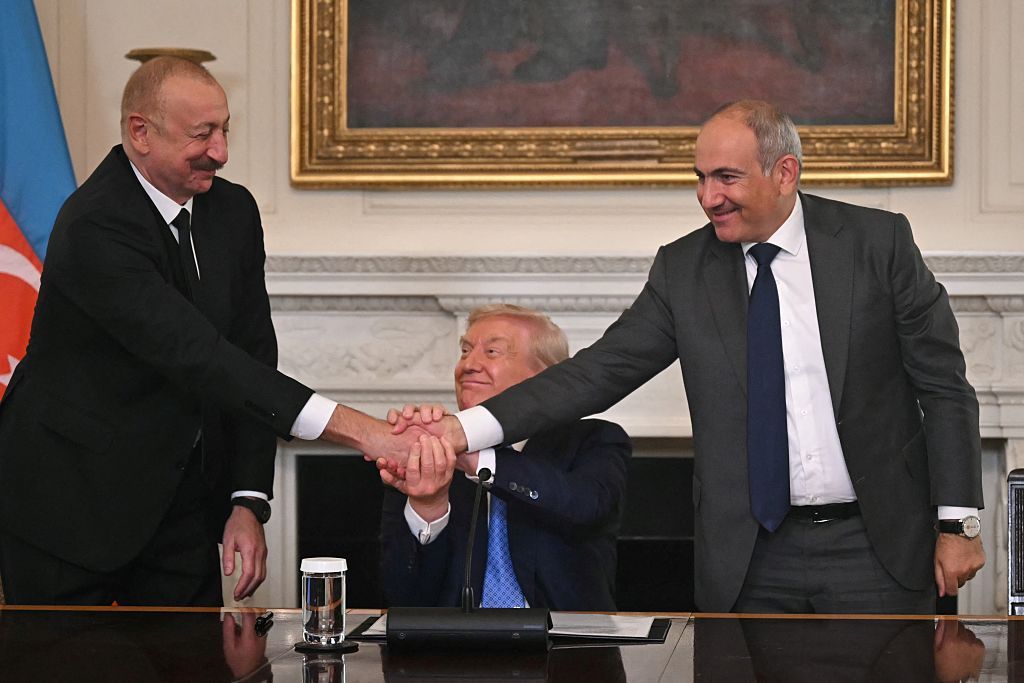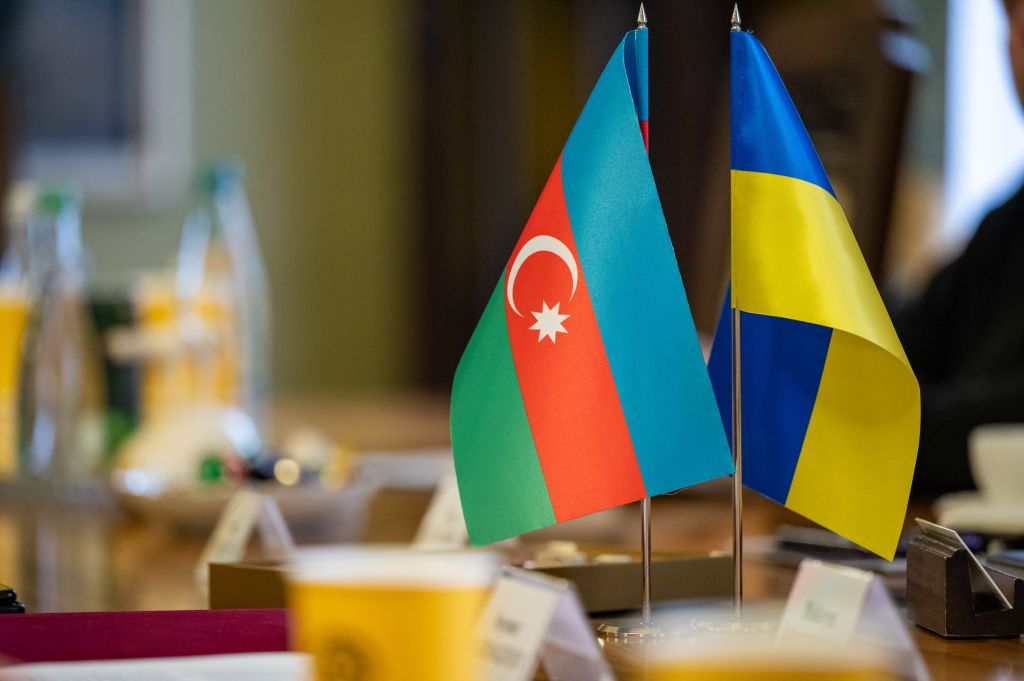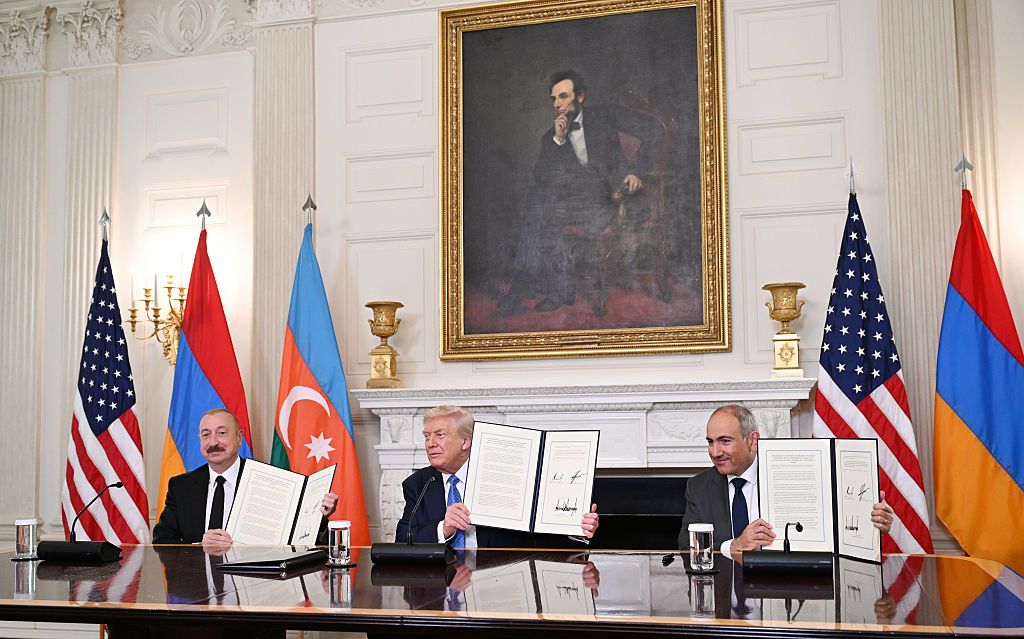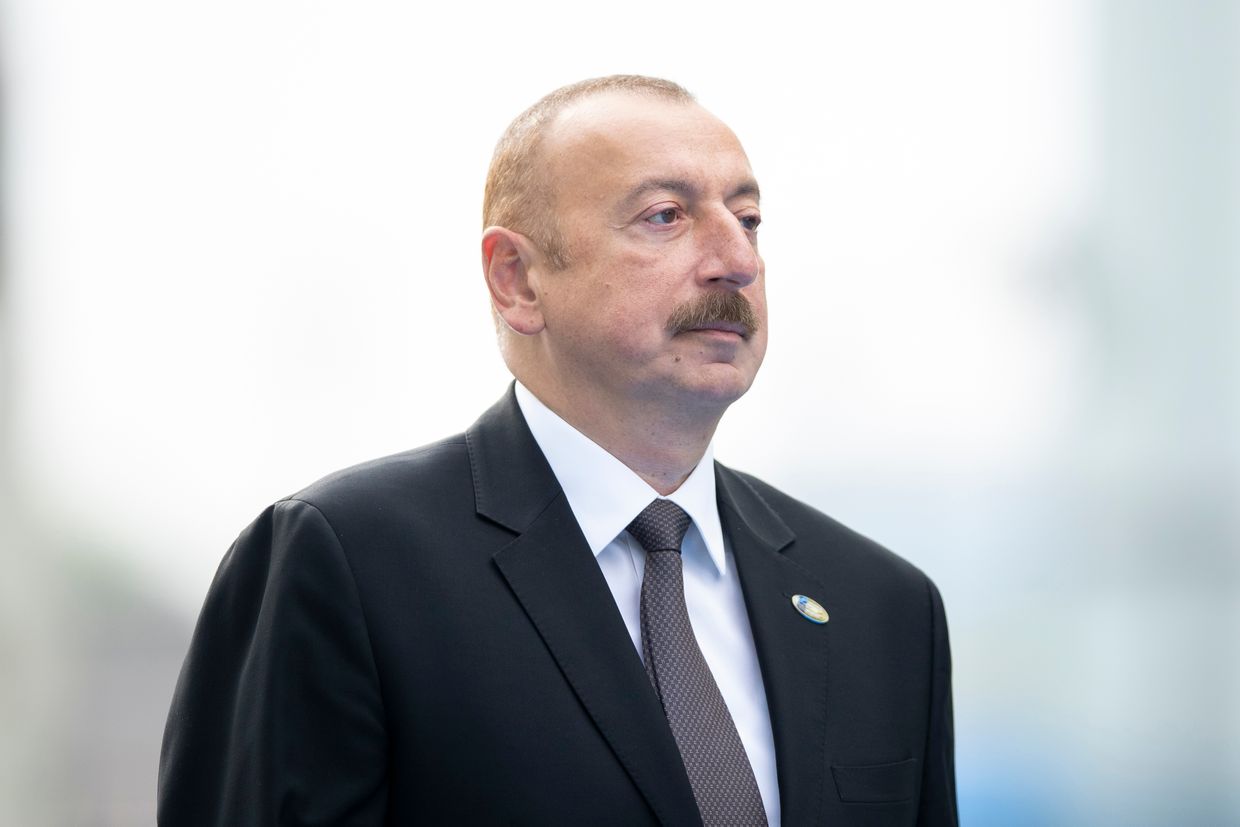As Russian influence wanes in South Caucasus, Azerbaijan emerges as regional hegemon

U.S. President Donald Trump (L) greets Azerbaijani President Ilham Aliyev (R) at the White House in Washington, D.C., U.S. on Aug. 8, 2025. (Brendan Smialowski / AFP via Getty Images)
As Russia is obsessed with conquering Ukraine, there is one region that is rapidly slipping out of its grip: the South Caucasus.
Russia's influence in the region is decreasing, while Azerbaijan and its main ally, Turkey, are emerging as new regional leaders.
"Russia's ability to be a hegemon has been weakened, and its influence continues to wane (in the region)," John DiPirro, a senior fellow at the Central Asia-Caucasus Institute, told the Kyiv Independent. "Russia has left a void that Azerbaijan is keen to fill."
Azerbaijan, which has benefited from a windfall of oil and gas revenues, has revamped its military and now feels more confident than ever.
In 2023, Azerbaijani troops took over Nagorno-Karabakh, a breakaway entity in Azerbaijan backed by Armenia.
Despite being formally a military ally of Moscow, Armenia received no help from Russia, souring the relationship and sidelining the Kremlin during the subsequent peace talks.
Since the Dec. 25, 2024, Azerbaijan Airlines plane crash, likely caused by Russian air defense, relations between Baku and Moscow have nosedived as well. Following the success in Nagorno-Karabakh, Azerbaijan has felt sufficiently emboldened to stand up to Russian pressure and take an independent stance.
Russia's influence in the South Caucasus has declined so much that Moscow played no role in the Aug. 8, 2025, preliminary peace agreement between Baku and Yerevan.
The deal was a major win for Azerbaijan as Armenia recognized its sovereignty over Nagorno-Karabakh.
The Russian, Azerbaijani, and Armenian governments did not respond to requests for comment.
The weakening of Russia
The geopolitical situation in the Caucasus has changed dramatically due to Russia's reduced influence, analysts say.
One of the reasons is that Russia has prioritized its war against Ukraine since 2022.
"Russia is focused on Ukraine and keeping its economy alive," DiPirro said. "It diverts focus from other countries."
Another reason is Russia's failure to intervene in the recent Nagorno-Karabakh wars.
Armenia is a member of a Russian-led military bloc, the Collective Security Treaty Organization (CSTO). Russia also has a military base in the Armenian city of Gyumri.

Azerbaijan seized most of the territory controlled by Nagorno-Karabakh, an Armenian-controlled self-proclaimed republic within Azerbaijan's internationally recognized borders, in 2020. Russia decided not to help its ally, although Russian peacekeepers were deployed in the Lachin corridor, which linked Armenia and Nagorno-Karabakh.
In 2022, Azerbaijan seized control of the Lachin corridor as well, and Russian peacekeepers had to withdraw. Azeri troops also occupied part of Armenia's internationally recognized territory along the border the same year.
Armenia saw Russia as the main protector against Azerbaijan and Turkey and was willing to do basically whatever it takes to keep Russia on its side, hoping that when things get difficult, they will step in.
The final reckoning came in 2023, when Azerbaijan captured the remaining part of Nagorno-Karabakh, and the self-proclaimed entity was formally liquidated.
Previously, Russia had presented itself as both a protector of Armenia and a key mediator in Azerbaijani-Armenian relations.
"However, when it came to actual war in Nagorno-Karabakh, Russia was nowhere to be found," DiPirro said. "It sends a message to other Russian allies."

Natalie Sabanadze, a Caucasus expert at Chatham House, said that "Armenia saw Russia as the main protector against Azerbaijan and Turkey and was willing to do basically whatever it takes to keep Russia on its side, hoping that when things get difficult, they will step in."
"Well, things did get difficult and Russia didn't step in," she added. "So I think that trust is completely broken."
She argued that a peace deal between Baku and Yerevan "would not have happened and things would not have changed this way if Russia had backed Armenia."
"Russia was in the middle of a war, fighting Ukraine. It's a question of bandwidth," Sabanadze argued. "But Russia also didn't want to antagonize both Turkey and Azerbaijan at this point. So this was an opportunity that Baku seized."
After the Nagorno-Karabakh wars, Armenia also suspended its country's membership in the Russian-led CSTO bloc in 2024 and announced plans to join the European Union in March 2025. In recent months, there has also been a crackdown on the pro-Russian opposition in Armenia.
Azerbaijan's rise
As Russia's role declined, Azerbaijan increased its clout thanks to help from Turkey, which allowed it to reform its army and provide weapons and military training, DiPirro said.
With Russian energy supplies undermined by sanctions, Azerbaijan has also been able to foster ties with the West.
Europe has increasingly looked to Azerbaijan to diversify its energy portfolio.
"Azerbaijan has stepped up to fill that role and emerged as a stronger, self-sufficient partner," DiPirro said.
As Baku has taken a more confident and independent stance, Azerbaijan and Russia have clashed over the past year.
"Due to Russia's weakened influence, Azerbaijan saw an opportunity," DiPirro said.
The trigger for the deterioration in bilateral relations was the Azerbaijan Airlines plane crash.
The plane, which was carrying passengers from Baku, Azerbaijan, to Grozny in Russia's Chechen Republic, crashed near the coastal city of Aktau in Kazakhstan. Thirty-eight people died as a result.
The reported use of air defense systems aligns with multiple media reports of air defense working in the region during a Ukrainian drone attack on the morning of Dec. 25.


Azerbaijani President Ilham Aliyev explicitly blamed Russia for the downing and criticized Moscow for not closing its airspace prior to the aircraft's landing and engaging in a cover-up by promoting "absurd versions" of the crash.
In June, Russian police detained 50 Azerbaijanis as part of a murder investigation in Yekaterinburg. Two people died during the detentions, and three others were seriously injured.
Azerbaijan called the killings "ethnically motivated" and "unlawful" actions.
Later in June, Azerbaijani police detained two alleged Russian spies at the Baku office of the Russian state-controlled news agency Sputnik.
The diplomatic crisis has already affected Azerbaijan's relations with Kyiv.
In July, Ukraine's state energy giant Naftogaz signed its first agreement to import natural gas from Azerbaijan.
In August, Russian forces launched Shahed drones at an oil depot in Odesa Oblast belonging to the Azerbaijani state oil and gas company SOCAR. Four SOCAR employees were seriously injured.
Baku may even consider lifting its ban on supplying Ukraine with weapons from its arsenal if Russia continues targeting Azerbaijani interests in Ukraine, Azerbaijani outlet Caliber reported on Aug. 10, citing unnamed sources. The Kyiv Independent could not independently verify the report.
The Defense Express news site also reported on Sept. 6 that MiG-29 planes that previously belonged to Azerbaijan's air force had been spotted in Ukraine. The Kyiv Independent could not independently verify the report.
Meanwhile, Russia's Federal Security Service (FSB) said on Sept. 8 that it had detained an Azerbaijani citizen accused of preparing attacks on law enforcement buildings in Stavropol Krai on behalf of Ukraine.
A breakthrough in peace talks
Becoming the sole powerbroker in the region, Azerbaijan was able to dictate its own terms to Armenia, which has been actively trying to normalize relations with its former foes — Baku and Ankara.
Azerbaijan and Armenia took part in a ceremony hosted by U.S. President Donald Trump at the White House on Aug. 8, giving their preliminary approval to a peace deal. The deal has yet to be signed, however.
The two countries agreed to respect each other's sovereignty and territorial integrity.
Additionally, a transit corridor between the two countries — sometimes called the Zangezur Corridor — connecting mainland Azerbaijan to its Nakhchivan exclave, located west of Armenia, is expected to be created, according to the deal. The U.S. obtained exclusive development rights for the corridor and is expected to lease the land to a consortium of private companies.

For the first time in history, it's the U.S. that is acting as a mediator in the region, once part of the Soviet Union.
DiPirro argued that the deal also provides "increased economic opportunities for both Azerbaijan and Armenia."
The reconciliation between Armenia and Azerbaijan allows them to use the west-east transport and trade route between the Black Sea and Central Asia, he argued.
This is not in the interests of the Kremlin, which has favored the north-south route running from Russia to Iran, he added.
Azerbaijan's victory lap
Vadim Dubnov, a Caucasus expert at the Carnegie Endowment for International Peace, told the Kyiv Independent that the peace deal is mostly in Azerbaijan's favor and provides opportunities for Baku to continue to pressure Yerevan.
Azerbaijan has demanded that Armenia change its constitution and delete the references to the country's 1990 declaration of independence, which called for the country's unification with Nagorno-Karabakh.
"This will be a really difficult thing for (Armenian Prime Minister Nikol) Pashinyan to do," Sabanadze said.
Dubnov also said that, for Azerbaijan, the peace agreement is a chance to repair its relations with the West and curry favor with Trump.
The West has criticized Azerbaijan for jailing hundreds of political prisoners, rigging elections, and restricting the freedom of speech and assembly.
At the same time, Europe needs Azerbaijani oil and gas as an alternative energy source.
"Yes, (Europe) will raise the issue of human rights here and there," Sabanadze said. "But Europe wants an alternative source of energy. And Azerbaijan is there with infrastructure. So it's a question of prioritizing."
Armenian perspective
For Pashinyan, the peace deal is both a way to guarantee Armenia's security and withdraw from Russia's orbit.
"They hope that this gives Armenia a kind of security guarantee," Sabanadze said. "That gives them protection from a potential future attack from Azerbaijan because there has always been this fear that, with this Zangezur (corridor issue) unresolved, Baku will decide to once again try and do it with force."
Meanwhile, the approval rating of Pashinyan, who has been in power since 2018, has plummeted as he came under fire for losing the Nagorno-Karabakh wars.
Despite this, Pashinyan's party kept its majority in parliament in the 2021 election. The next election is scheduled for 2026.

Dubnov believes that Pashinyan's peace agenda is the key reason for his political survival.
Although the Armenians are unhappy about losing the wars to Azerbaijan, a majority of them still favor peace with Azerbaijan as a key guarantee of the country's security, Dubnov added.
"Peace with Azerbaijan will be a serious argument in the next election," he said. "Pashinyan has kept his power due to the opposition's weakness and due to his peace agenda."
'Turkish backyard'
The void left by Russia has also been filled by Turkey, a close partner and ally of Azerbaijan.
"I wouldn't call (Azerbaijan) a satellite (of Turkey)," Sabanadze said. "I think there is a lot of mutual gain out of this relationship. There are also, obviously, civilizational, historic ties."
She added that "Turkish policy towards Caucasus is very much driven by Azerbaijan" and "there is a mutually reinforcing relationship that helps them both."
Meanwhile, DiPirro said that "Turkey is expanding its influence to Central Asia and all the way to Mongolia without provoking or angering Russia or China."
The peace talks between Baku and Yerevan have also prompted Armenia to seek reconciliation with Turkey.
Historically, relations between Armenia and Turkey have been marred both by Ankara's refusal to recognize the 1915-1917 genocide of Armenians in the Ottoman Empire and by Turkey's support for Baku during the Nagorno-Karabakh wars.
Pashinyan, however, broke with precedent in July by holding a historic meeting with Turkish President Recep Tayyip Erdogan.

"The best way for Armenia to actually benefit from its location rather than be a hostage of it is to normalize relations with Turkey," Sabanadze said. "And that signing of (the peace deal) is also another possibility for Armenia-Turkey normalization, which Ankara is very interested in."
Yet, despite losing its influence, Russia still maintains a relationship with both Azerbaijan and Armenia.
Analysts also say that Russia has not been completely ousted from the South Caucasus yet.
"Azerbaijan is pragmatic," DiPirro said. "There are still economic benefits. It would be unrealistic for them to stop dealing with Russia completely."


